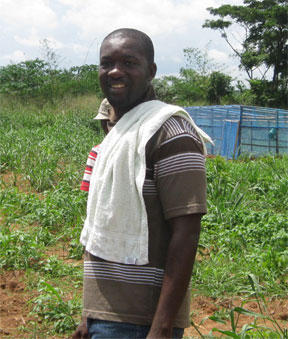
Among farmers in western Africa, the passion for agriculture runs deep. Kwabena (Koby) Yeboah farms near the village of Gomoa Adumase about 45 minutes outside of Accra, Ghana in West Africa, driven by his focus and intent to succeed.
Koby started farming five years ago at the age of 22. “I love the outdoors, working with my hands and making things grow,” he says.” I also enjoy hunting too, anything to be outside.” It’s a familiar refrain you’ll hear from almost any farmer you visit in North America. It’s all about the outdoors and a certain respect for the land. (Photo)
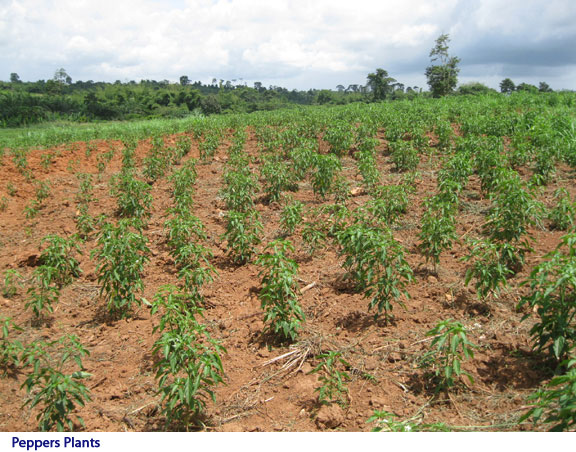 Today he is working on bringing about 200 acres into production on his farm. Over the past five years Koby has built roads, cleared land, accessed water and prepared for production. With a number of full-time villagers who are on the farm every day caring for crops and land, he visits the farm about three days a week, but his mind is on the farm every day. He is anxious for the day when he can bring all of his 850 acres into production and be able to spend seven days a week on the farm. Until then he continues his role as an education consultant recruiting students to schools in Ghana in order to support his family, while spending as much time as he can feeding his passion for farming.
Today he is working on bringing about 200 acres into production on his farm. Over the past five years Koby has built roads, cleared land, accessed water and prepared for production. With a number of full-time villagers who are on the farm every day caring for crops and land, he visits the farm about three days a week, but his mind is on the farm every day. He is anxious for the day when he can bring all of his 850 acres into production and be able to spend seven days a week on the farm. Until then he continues his role as an education consultant recruiting students to schools in Ghana in order to support his family, while spending as much time as he can feeding his passion for farming.
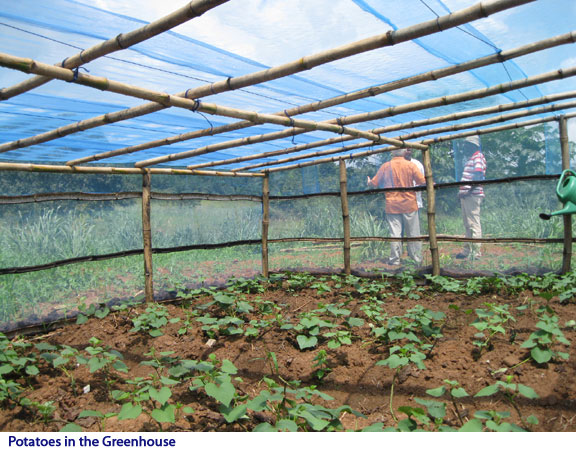 Koby grows pineapple, maize, peppers, tomatoes and okra. In the near future he plans to add mushrooms, snail production, and has begun work developing a fish pond for Tilapia production. The diversification is impressive. He is also growing several different varieties of specialty potatoes in a custom greenhouse. His plans are to increase potato seed production for planting on his farm and to educate other farmers on growing these potatoes in hopes of expanding acreage around the region. He will seek and secure markets for the potatoes and work to build a reliable and effective means for the region to become a trusted supplier. It is upon the backs of individual farmers and small business operators that economic success will be built.
Koby grows pineapple, maize, peppers, tomatoes and okra. In the near future he plans to add mushrooms, snail production, and has begun work developing a fish pond for Tilapia production. The diversification is impressive. He is also growing several different varieties of specialty potatoes in a custom greenhouse. His plans are to increase potato seed production for planting on his farm and to educate other farmers on growing these potatoes in hopes of expanding acreage around the region. He will seek and secure markets for the potatoes and work to build a reliable and effective means for the region to become a trusted supplier. It is upon the backs of individual farmers and small business operators that economic success will be built.
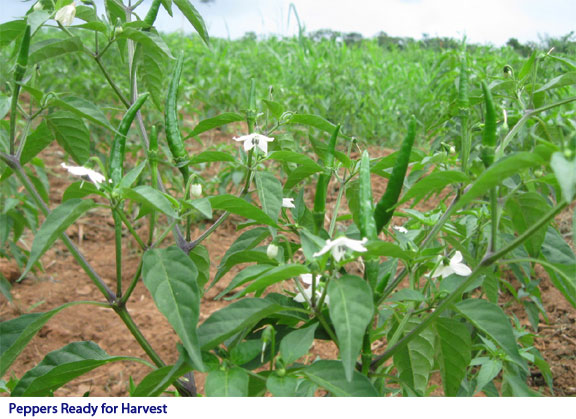 Koby’s vision is to turn his farm into a key center of commerce for the village. When he puts out the call for harvest help 40 to 100 people arrive at his farm looking for work, forcing Koby to turn people away. But he has plans to grow and to create a solid source of continued employment for the villagers. His agriculture plan calls for planting dates staggered every six weeks, year round.
Koby’s vision is to turn his farm into a key center of commerce for the village. When he puts out the call for harvest help 40 to 100 people arrive at his farm looking for work, forcing Koby to turn people away. But he has plans to grow and to create a solid source of continued employment for the villagers. His agriculture plan calls for planting dates staggered every six weeks, year round.
The climate in the region is very steady and stable with consistent temperatures and consistent rainfall year round making it a perfect climate for staggered production. By creating a pattern where harvest and planting activities are happening every month of the year, he could employ farm help every month of the year. The impact of consistent, uninterrupted employment for the village would be an economic boon to the region, and Koby is well aware of this fact. He often speaks of one day being able to provide steady employment to the villagers.
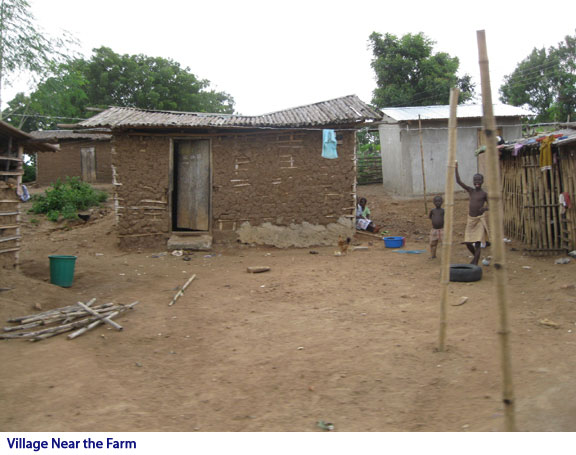 The villages in rural Ghana are agrarian in nature, mainly for subsistence but also for commercial gain. There is available land, potentially productive but largely untouched in this region. There are also many able hands available in the nearby villages looking for productive work, but too often idled by lack of need for their assistance. Koby Yeboah sees an opportunity to make a difference for the region by setting a strong example for others and helping fellow farmers succeed. It is a sense of honor and commitment not readily found among your average 27 year old, but certainly not lost on this man.
The villages in rural Ghana are agrarian in nature, mainly for subsistence but also for commercial gain. There is available land, potentially productive but largely untouched in this region. There are also many able hands available in the nearby villages looking for productive work, but too often idled by lack of need for their assistance. Koby Yeboah sees an opportunity to make a difference for the region by setting a strong example for others and helping fellow farmers succeed. It is a sense of honor and commitment not readily found among your average 27 year old, but certainly not lost on this man.
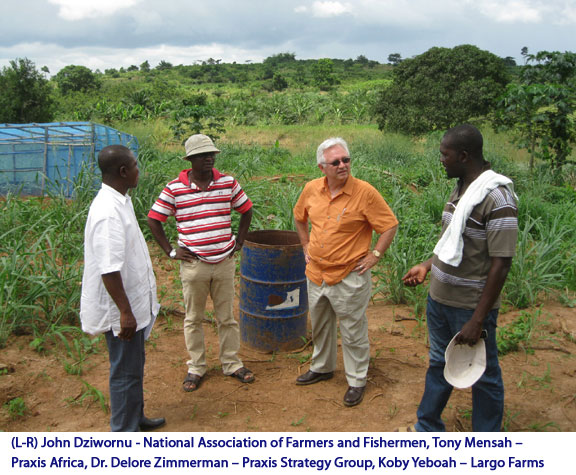 An example of his commitment to the region, Koby has created a “model farm” just outside the village of Gomoa Adumase. Here on one acre of land he has tilled and prepared the soil and is demonstrating advanced farming practices for raising pineapple. He is teaching other farmers and villagers in the region about the new farming practices so they can learn and produce on their own, and doing it in an entirely hands-on environment. (Photo)
An example of his commitment to the region, Koby has created a “model farm” just outside the village of Gomoa Adumase. Here on one acre of land he has tilled and prepared the soil and is demonstrating advanced farming practices for raising pineapple. He is teaching other farmers and villagers in the region about the new farming practices so they can learn and produce on their own, and doing it in an entirely hands-on environment. (Photo)
 The sense of community in the area is strong and Koby has grown to become an important part of it. Knowing that the villagers live on tight budgets he says, “I contribute all he can,” often purchasing school uniforms for a number of the children. But, the support doesn’t end there. Just outside the village lies the Gomoa Buduatta Orphanage, home to 16 beautiful young boys and girls who find a safe and secure place to live and go to school. Koby has taken on the incredibly honorable challenge of supporting the orphanage to the best of his ability. Again he says, “I contribute all I can” and you know that it is well appreciated.
The sense of community in the area is strong and Koby has grown to become an important part of it. Knowing that the villagers live on tight budgets he says, “I contribute all he can,” often purchasing school uniforms for a number of the children. But, the support doesn’t end there. Just outside the village lies the Gomoa Buduatta Orphanage, home to 16 beautiful young boys and girls who find a safe and secure place to live and go to school. Koby has taken on the incredibly honorable challenge of supporting the orphanage to the best of his ability. Again he says, “I contribute all I can” and you know that it is well appreciated.
Upon visiting the orphanage the house mother greeted us and invited us in to the quaint accommodations. We visited for a few moments before she invited the children in to say hello. All 16 children came to the door, graciously removed their shoes and stepped inside. Tallest to the back, shortest to the front, nary a word said. As we engaged the children in conversation they were pleasant, extremely polite and often responded as a group in verbal unison. They were just wonderful children.
We toured the facility to see the sleeping quarters for the 8 boys and the quarters for the 8 girls before stepping into the two small classrooms. It is a humble building, but you can see that to these children it is home and it is safe. Upon our departure all sixteen children in a melodic tone said, “Thank you Mr. Koby.” The whole experience was beyond impressive. (Photo)

Returning from the tour of the farm, discussion turns to the fragile economy of Ghana and the poor condition of the infrastructure and road system. When asked about it Koby responds, “I live in my own economy. I don’t live in the economy of Ghana,” a stark statement that quiets discussion momentarily. He goes on to explain, “I have a plan and a program. I know what I need to do to succeed and that’s all I am focused on. I cannot worry about what I cannot control.”
Koby Yeboah has a goal, a plan and is driven to succeed. He says, “I want to be the best farmer in Africa within 10 years.” And you know what? I believe he is just the man to do it.
Dr. Colin N. Clarke is a senior strategist for AdFarm, a North American agriculture communications firm. AdFarm is a strategic partner of Praxis Strategy Group an economic development consultancy. Follow Dr. Clarke on Twitter @colinnclarke.












